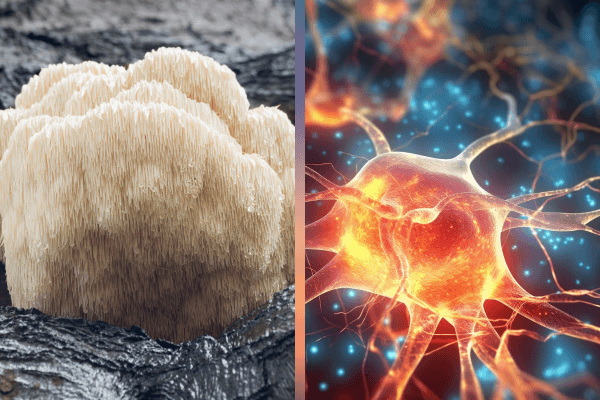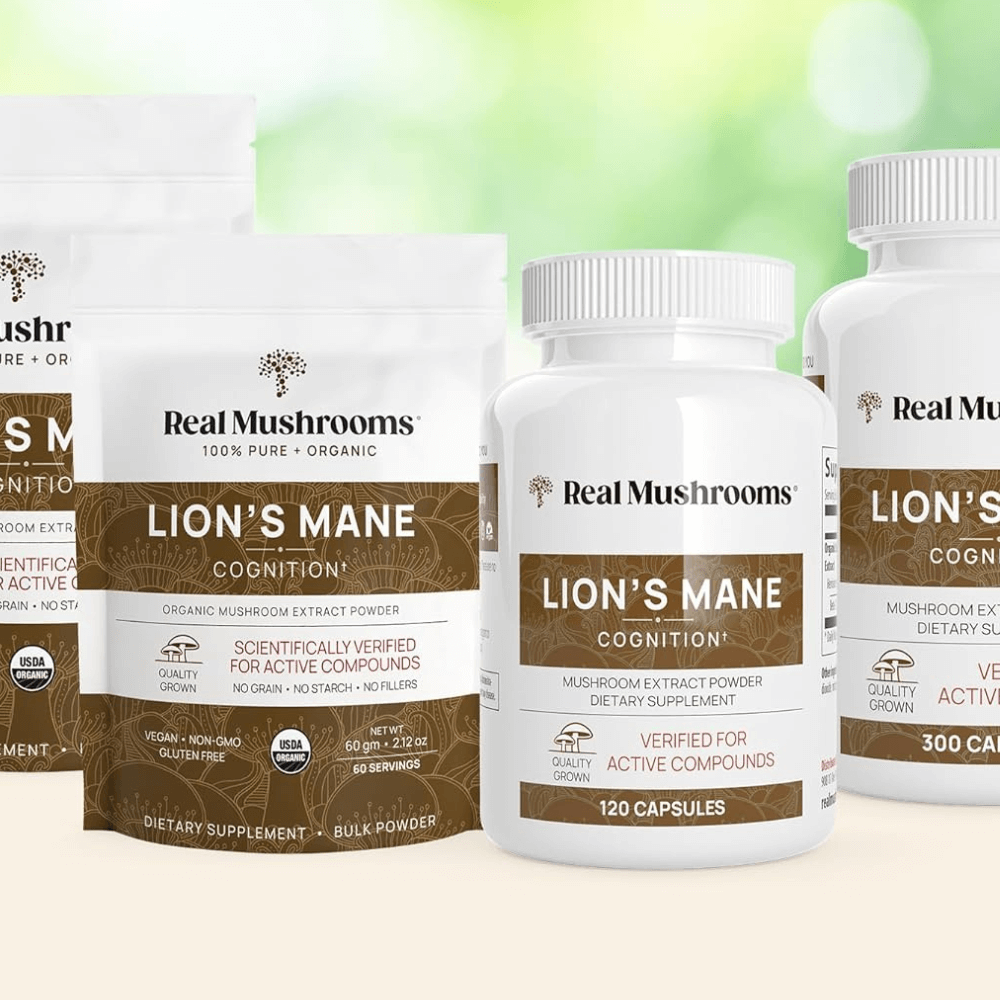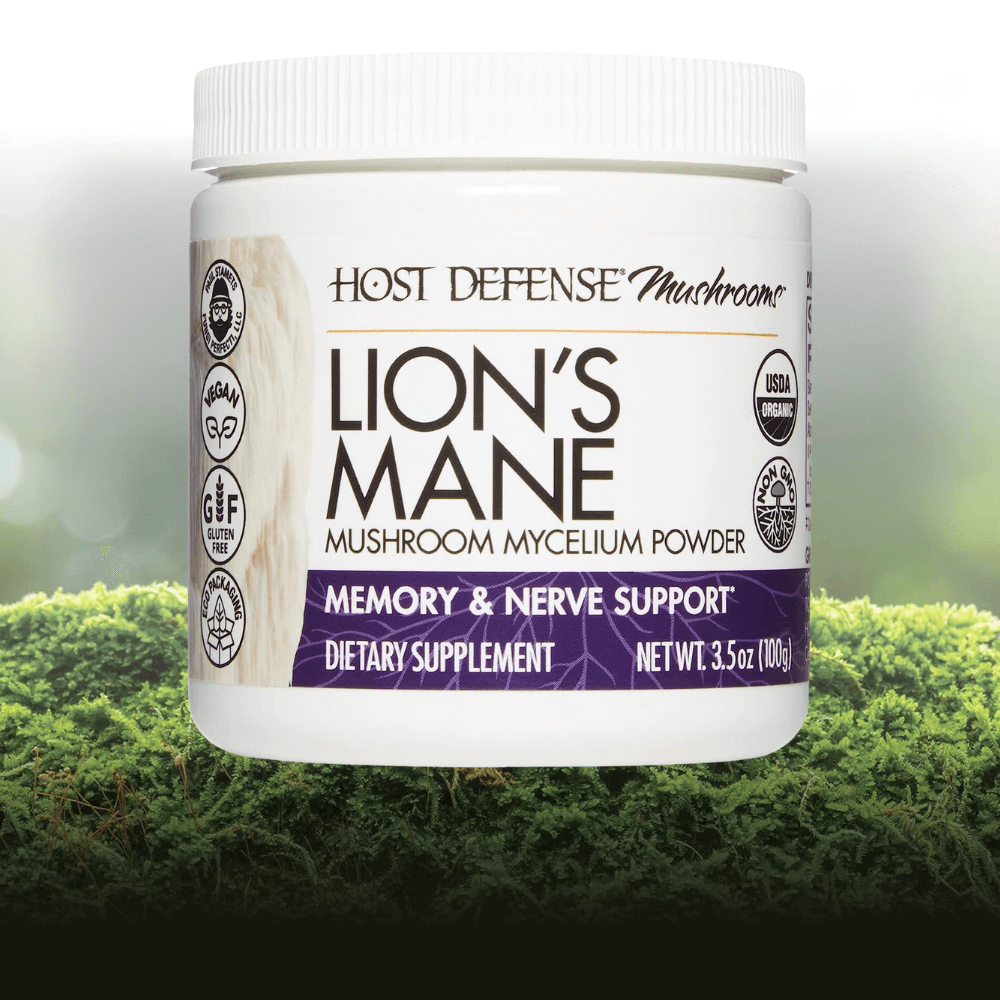Key Takeaways:
- Lion's mane powder is linked to enhanced brain health and cognitive function.
- It may aid in nerve repair and support heart and immune system health.
- Ongoing research continues to uncover the full spectrum of lion's mane powder benefits.
Lion's mane mushrooms have been a staple in traditional Asian medicine for centuries, but it's only in recent years that the Western world has begun to recognize their potential.
With a growing body of research, the many health benefits of lion's mane, particularly in powder form, are becoming increasingly apparent. This article will analyze the myriad of health benefits associated with lion's mane powder, supported by scientific studies and expert insights.
The Science Behind Lion's Mane Mushroom Powder
Lion's mane medicinal mushrooms, scientifically known as Hericium erinaceus, are not only known for their unique appearance but also for their medicinal properties.

When processed into a fine powder, the lion's mane mushroom daily becomes a convenient supplement. The powdered lion's mane is rich in bioactive substances that have been shown to impact brain health, nerve growth, and overall well-being.
Cognitive Enhancements and Brain Health
One of the most celebrated lion's mane powder benefits is its impact on brain health. Research involving humans and animal studies alike have shown that compounds in lion's mane can stimulate the production of nerve growth factor (NGF), which is crucial for the maintenance and growth of brain nerve cells.
This could be particularly beneficial for brain injury recovery or combating conditions like mild cognitive impairment.
Nerve Repair and Neuroprotective Properties
Lion's mane supplementation goes beyond just cognitive brain function. It appears to have neuroprotective properties that may assist in nerve repair. This is particularly relevant in the context of biomedical research focused on diseases that affect the nervous system.
Lion's mane extracts have been studied for their potential in promoting the regeneration of nerve cells, which could have implications for diseases like multiple sclerosis or for individuals recovering from nerve damage.
Heart Health and Cholesterol Management
Heart disease remains a leading cause of death worldwide, and lion's mane may play a role in heart health. Some studies suggest that taking lion's mane mushroom can have a positive effect on cholesterol levels, potentially lowering the risk of heart disease.
The anti-inflammatory effects of lion's mane mushroom may also contribute to its cardiovascular benefits.
Immune System Support and Anti-Inflammatory Effects
The immune health benefits of lion's mane are another area of interest. The mushroom is believed to have immune-modulating effects, which can enhance the body's defense mechanisms.
Additionally, the anti-inflammatory properties of lion's mane make it a candidate for alternative medicine, especially for those seeking to reduce reliance on nonsteroidal anti-inflammatory drugs (NSAIDs).
Lion's Mane as a Culinary Delight and Nutrient Powerhouse
Lion's mane mushrooms are not only celebrated for their medicinal properties but also revered in the culinary world. When cooked, lion's mane mushrooms offer a flavor reminiscent of seafood, particularly lobster or crab, making them a unique meat substitute for vegetarians and vegans.
Beyond taste, the health benefits of lion s mane extend to its nutritional profile. Rich in antioxidants, beta-glucans, and vitamins, incorporating lion's mane mushroom powder into daily meals can contribute to overall well-being.
This dual-purpose use positions lion's mane mushrooms as as both a functional food and a therapeutic agent, aligning with the growing trend of foods that support health beyond basic nutrition.
In Asian countries, particularly Japan and China, lion's mane medicinal mushroom has been a staple in traditional dishes for centuries. The fruiting body of the mushroom is often used fresh or dried, while powdered lion's mane is a more recent innovation that offers versatility in modern cuisine.
By integrating lion's mane powder into soups, teas, or smoothies, individuals can enjoy the benefits of lion's mane in a variety of palatable forms.
The culinary applications of lion's mane not only make it accessible to a broader audience but also encourage consistent lion's mane supplementation as part of a balanced diet.

Enhancing Everyday Health with Lion's Mane Lion's mane powder benefits extend beyond the realm of cognitive enhancements and delve into the sphere of everyday health.
Studies have shown that incorporating lion's mane supplements into one's daily regimen can lead to improvements in overall vitality and well-being. Older adults, in particular, may find that taking lion's mane mushroom can contribute to a more active and engaged lifestyle.
The medicinal mushroom Hericium erinaceus, which the lion's mane medicinal mushroom is derived from, has been used in traditional medicine for centuries, and modern research is beginning to validate its role in supporting everyday health.
The anti-inflammatory effects of lion's mane are particularly noteworthy, as chronic inflammation is a common issue that can lead to various health problems.
By potentially reducing the need for nonsteroidal anti-inflammatory drugs, which can have adverse side effects, lion's mane offers a natural alternative.
Peer-reviewed studies have indicated that the regular consumption of lion's mane may help manage body weight and blood sugars, which are critical factors in maintaining everyday health. This positions lion's mane as a valuable supplement for those looking to enhance their daily health routine.
Lion's Mane and Cognitive Health in Mild Alzheimer's Disease The effects of lion's mane extract on cognitive health have garnered significant attention, especially in the context of mild Alzheimer's disease.
Cognitive test scores in individuals with mild cognitive impairment have shown promising improvements when taking lion's mane extract. This suggests that lion's mane may have the potential to slow the progression of cognitive decline associated with Alzheimer's.
The neurotrophic properties of lion's mane are believed to stimulate the growth of brain cells, which could be particularly beneficial in older adults experiencing early signs of memory loss.
In a controlled study, a placebo group was compared with participants who were given lion's mane supplements. The results indicated that those taking lion's mane exhibited better cognitive function than the placebo group.
While these findings are preliminary and more research is needed, they offer hope for families affected by Alzheimer's disease.
Only high-quality sources and peer-reviewed studies should be considered when evaluating the efficacy of the lion's mane supplement in cognitive health, but the current evidence points to a potential breakthrough in managing symptoms of mild Alzheimer's disease with natural supplements like lion's mane.
Lion's Mane and Cognitive Disorders
The potential of lion's mane powder benefits in the context of cognitive disorders is a subject of increasing interest among researchers. Studies suggest that a lion's mane mushroom daily extract may offer neuroprotective benefits that could be pivotal in the management of conditions like mild Alzheimer's disease.
The active compounds within the mushroom, such as hericenones and erinacines, have been shown to stimulate the growth of brain cells, which could slow or reverse the cognitive decline associated with neurodegenerative diseases.
Continued research into the effects of lion's mane on cognitive disorders is supported by peer-reviewed studies that indicate improved cognitive function when taking lion's mane supplements.
Although the exact mechanisms are still being unraveled, the evidence for powdered lion's mane points towards the mushroom's ability to enhance synaptic plasticity, which is crucial for learning and memory.
This positions lion's mane as a promising natural adjunct to traditional treatments for cognitive impairment, potentially improving the quality of life for individuals with mild Alzheimer's disease and other cognitive conditions.
Lion's Mane as a Natural Pain Reliever
Lion's mane may also play a role as a natural pain reliever, particularly in the context of diabetic nerve pain.
The mushroom lion's mane appears anti-inflammatory effects, which have been compared to those of nonsteroidal anti-inflammatory drugs (NSAIDs), could be beneficial in reducing the discomfort associated with neuropathy.
By mitigating inflammation, lion's mane supplements may alleviate pain without the side effects commonly associated with pharmaceutical painkillers.
The analgesic properties of lion's mane are not only limited to diabetic nerve pain but may extend to other forms of chronic pain as well. Only high-quality sources of lion's mane extract should be considered for this purpose to ensure efficacy and safety.
As research progresses, the full scope of lion's mane's pain-relieving potential is becoming clearer, offering hope for a natural and holistic approach to pain management.
Lion's Mane and Its Role in Synergistic Herbal Practices
In the realm of herbal medicine, the concept of synergy is paramount, and lion s mane appears to play a significant role in this context. Traditional practitioners often combine medicinal mushrooms like lion's mane with other herbs to enhance the overall efficacy of treatments.
For instance, in treating cognitive decline, lion s mane mushroom daily intake might be paired with ginkgo biloba or other nootropics to potentiate cognitive benefits. This approach is supported by studies published in journals such as the International Journal of Medicinal Mushrooms (Int J Med Mushrooms), which explore the interactive effects of different botanicals.

Moreover, the use of lion s mane extracts in conjunction with other natural compounds is being investigated for its potential to reduce reliance on pharmaceuticals, such as nonsteroidal anti-inflammatory drugs (NSAIDs).
The anti-inflammatory effects of lion's mane extracts, as documented in the several scientific journals, suggest that when used alongside other anti-inflammatory herbs, the mushroom could offer a holistic alternative to conventional treatments.
This integrative approach not only underscores the versatility of lion s mane powder benefits but also aligns with the principles of traditional complementary medicine.
Potential for Diabetes Management
Lion's mane may also be beneficial for individuals with diabetes. Some research suggests that lion's mane mushroom powder can lower blood sugar levels, which is crucial for managing diabetes.
This could be particularly useful for those who are looking to complement their diabetes medications with natural supplements for blood sugar down.
Digestive and Gut Health
The digestive tract is another area where lion's mane powder shows promise. The mushroom contains compounds that may support the intestinal immune system and promote gut health. This is in line with the practices of Chinese medicine, which has long recognized the gut as a cornerstone of overall health.
Mental Health and Mood Regulation
Mental health is a growing concern, and lion's mane powder benefits might extend to this realm as well. Some animal studies also have linked lion's mane supplementation to improved mood and reductions in symptoms of major depressive disorder.
This could be a significant development in restorative medicine, offering a natural approach to managing mental health conditions.
Safety, Dosage, and Considerations
While lion's mane mushroom powder offers many potential health benefits, it's important to consider safety and dosage. Most human studies have used doses ranging from 0.5 to 3 grams per day.
It's also worth noting that individuals with a mushroom allergy should avoid lion's mane, and it may slow blood clotting, which could be a concern for those on blood-thinning medications.
The Future of Lion's Mane Research
Although the current evidence is promising, more research is needed to fully understand the effects of lion's mane on human health. The majority of studies have been small or animal-based, and larger, peer-reviewed studies are necessary to confirm these findings.
However, the potential health benefits of lion's mane make it a fascinating subject for future biomedical research.
Final Thoughts
Lion's mane powder is a medicinal mushroom that offers a range of health benefits, from enhancing brain function and nerve repair to supporting heart health and the immune system.
Its potential in managing diabetes, improving gut and immune health, and aiding mental health also makes it a valuable supplement. While more research is needed to fully understand its effects, lion's mane powder remains a promising natural remedy for various health concerns.
FAQ Section
Q: What is the recommended dosage for lion's mane powder?
A: The dosage used in research varies, but most human studies have used between 0.5 to 3 grams per day. It's important to follow the manufacturer's instructions or consult with a healthcare provider for personalized advice.
Q: Can lion's mane powder be used for brain injury recovery?
A: Preliminary research suggests that lion's mane may support brain injury recovery by promoting nerve growth and repair. However, more research involving humans is needed to confirm these effects.
Q: Are there any side effects associated with taking lion's mane powder?
A: Lion's mane is generally considered safe, but it may cause digestive upset in some people. It can also slow blood clotting, so individuals with bleeding disorders or those on blood-thinning medications should exercise caution. Always consult with a healthcare provider before adding new supplements to your regimen.










